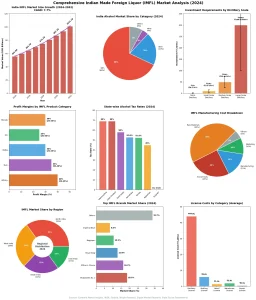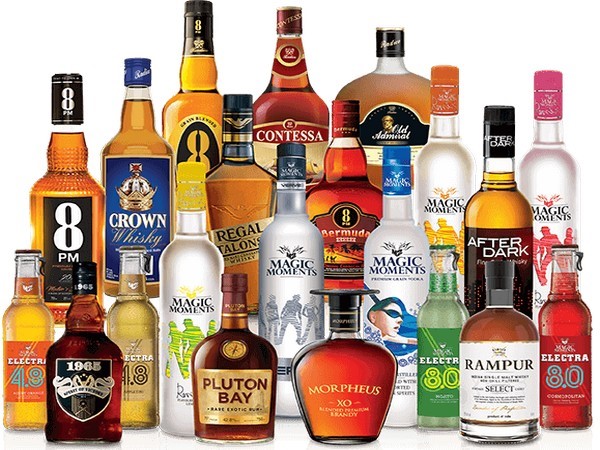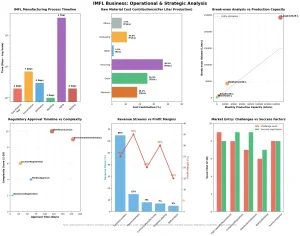Indian-made foreign liquor (IMFL) is the phrase officially used by governments, corporations, and the media in India to refer to all types of hard liquor/alcohol manufactured domestically aside from indigenous alcoholic beverages like feni, arrack, toddy, etc. Whisky, brandy, rum, gin, and vodka are among the distilled spirits included in the IMFL market category. Visit this Page for More Information: Start a Business in Alcohol Industry
Table of Contents
ToggleIMFL Full Form
IMFL stands for “Indian Made Foreign Liquor” – a term officially used by governments, corporations, and media in India to refer to all types of hard liquor/alcohol manufactured domestically, excluding indigenous alcoholic beverages.
Complete IMFL Definition
Indian Made Foreign Liquor (IMFL) refers to:
- Distilled spirits manufactured in India using modern distillation techniques
- Hard liquors including whisky, brandy, rum, gin, and vodka
- Alcohol products that follow international production standards
- Premium spirits distinct from country liquor or traditional Indian alcohol
Key Characteristics of IMFL
- Base Spirit: Made from neutral grain spirit distilled from molasses
- Alcohol Content: Typically 42.8% alcohol by volume after dilution
- Quality Standards: Regulated under FSSAI and state excise departments
- Production Method: Uses demineralized water for dilution and flavoring
IMFL vs Other Alcohol Categories
| Category | Definition | Examples | Market Share |
|---|---|---|---|
| IMFL | Indian-made hard liquor | Whisky, Rum, Vodka | 68% |
| Beer | Fermented alcoholic beverage | Lager, Ale | 20% |
| Wine | Fermented grape/fruit juice | Red, White, Sparkling | 4% |
| Others | Traditional & imported spirits | Feni, Arrack, Imported brands | 8% |
IMFL business will flourish in the future. Entrepreneurs planning to start this business will surely benefit. However, proper planning, registration, and licence are required to start an alcohol business in India. NPCS have gathered all information for you to understand this segment better.
India IMFL Market Overview (2024-2032)
Market Size & Growth Analysis
The Indian Made Foreign Liquor (IMFL) market has reached $60.11 billion in 2025 and is projected to grow at a CAGR of 7.7%, reaching $101.10 billion by 2032. This robust growth is driven by:
- Rising disposable income across urban and semi-urban markets
- Premiumization trend with consumers upgrading to higher-quality spirits
- Growing acceptance of alcohol consumption in social settings
- Expansion of retail networks and modern trade channels
IMFL’s Market Dominance
- Market Share: IMFL commands 68% of India’s total alcohol market
- Volume: 395 million cases sold in FY 2023
- Growth Rate: 12% volume increase in spirits category
- Regional Distribution: North India (35%), West India (28%), South India (22%), East India (15%)

Global Context
India has emerged as the largest market by volume and second-largest by value for several international spirit makers, making it a crucial market for both domestic and international brands.
Source: Coherent Market Insights, IWSR, Wright Research
Read Similar Articles: ALCOHOLIC AND NON-ALCOHOLIC BEVERAGES
NPCS analysts predicted that EMEA will lead the market for alcoholic beverages over the forecast period and may hold around 48% of the market by 2025. Supported product, the alcohol market is subdivided into international liquor, Indian-made foreign liquor, foreign liquor bottled in India, Indian-made Indian liquor, and various others.
In 2022, the Alcohol market is dominated by the Alcohol goods category. New product introductions and increasing incidences are anticipated to fuel the expansion of this sector.
Choose your Product There is a good chance that if you’ve been thinking about starting a liquor business, you’ve already solidified some strong preferences for various types of booze. Choosing your preferred liquor, such as vodka, whiskey, rum, or gin, is a way to combine your love of delectable cocktails with a way to make money. On the other hand, you should also make an effort to conduct research and choose the type of alcohol that will be produced most profitably and appeal to your target market.
Complete Licensing Guide for IMFL Business
Primary Licenses Required
1. Distillery License (Most Critical)
- Cost: ₹44 lakhs (may vary by state)
- Validity: Annual renewal required
- Requirements: Environmental clearance, fire safety approval
- Processing Time: 120-180 days
- Issuing Authority: State Excise Department
2. Environmental Clearance
- Cost: ₹5-8 lakhs
- Type: State/Central based on production capacity
- Requirements: EIA report, public hearing
- Processing Time: 180-240 days
- Validity: Project-specific
3. Excise Registration
- Purpose: Monthly duty payment and compliance
- Cost: ₹2-5 lakhs setup
- Monthly Obligations: Duty payment, returns filing
- Penalties: Heavy fines for non-compliance
State-wise License Variations
| State | Distillery License Fee | Annual Renewal | Additional Requirements |
|---|---|---|---|
| Karnataka | ₹40 lakhs | ₹35 lakhs | Water usage permit |
| Maharashtra | ₹45 lakhs | ₹40 lakhs | Pollution control board NOC |
| Rajasthan | ₹35 lakhs | ₹30 lakhs | Fire safety clearance |
| Uttar Pradesh | ₹50 lakhs | ₹45 lakhs | District collector approval |
Documentation Checklist
For Distillery License Application:
- Detailed project report
- Land ownership documents
- Environmental impact assessment
- Financial capability certificate
- Technical qualification certificates
- Layout plans and drawings
- Fire safety arrangements
- Water source and quality certificates
For FSSAI Registration:
- Form A application
- Identity and address proof
- Business registration documents
- Layout plan of premises
- List of food categories
- Water and medical certificates
Compliance Requirements
Monthly Obligations:
- Excise duty payment by 15th of following month
- Production and sales returns
- Stock reconciliation statements
- Quality control reports
Annual Requirements:
Fire safety certificate renewal
License renewal applications
Audit reports and financial statements
Environmental compliance reports
Complete IMFL Manufacturing Process
Stage 1: Raw Material Preparation (2 days)
- Molasses Processing: Quality testing and dilution (45% of cost)
- Water Treatment: Demineralization for consistent quality
- Grain Preparation: Milling and mashing for grain-based spirits
- Quality Control: Raw material analysis and approval
Stage 2: Fermentation Process (7 days)
- Yeast Addition: Controlled fermentation at 28-32°C
- Sugar Conversion: Converting sugars to alcohol (8-12% ABV)
- Monitoring: Regular pH and alcohol content checks
- Completion: Achieving desired alcohol concentration
Stage 3: Distillation (3 days)
- First Distillation: Producing wash at 25-30% ABV
- Rectification: Achieving 95-96% alcohol strength
- Continuous Process: Modern column stills for efficiency
- Quality Separation: Removing impurities and congeners
Stage 4: Blending & Flavoring (1 day)
- Dilution: Reducing to 42.8% ABV with demineralized water
- Flavor Addition: Natural and artificial flavoring compounds
- Caramel Coloring: Optional for appearance enhancement
- Imported Spirit Blending: Adding Scotch/Irish whiskey for premium products
Stage 5: Aging Process (365+ days)
- Maturation: Oak barrel aging for whisky and brandy
- Flavor Development: Chemical reactions for complexity
- Quality Monitoring: Regular sampling and analysis
- Climate Control: Temperature and humidity management
Stage 6: Final Processing & Bottling (2 days)
- Final Filtration: Removing any remaining impurities
- Quality Testing: Final alcohol content and taste approval
- Bottling: Automated filling and capping
- Labeling & Packaging: Brand labeling and carton packing
Manufacturing Cost Structure (Per Liter)
- Raw Materials: ₹280-350 (45%)
- Excise Duty: ₹150-200 (25%)
- Manufacturing: ₹90-120 (15%)
- Marketing: ₹60-80 (10%)
- Others: ₹30-40 (5%)
Total Cost: ₹610-790 per liter Selling Price: ₹900-1,200 per liter Gross Margin: 25-35%

Success Stories & Market Opportunities
Leading IMFL Success Stories
Case Study 1: Radico Khaitan Limited
- Founded: 1943, one of India’s oldest IMFL manufacturers
- Current Position: 3rd largest IMFL company in India
- Key Brands: 8PM, Magic Moments, Morpheus
- Annual Revenue: ₹2,500+ crores
- Success Factors: Premium positioning, export focus, innovation
Case Study 2: United Spirits Limited (Diageo)
- Market Share: 18.5% with McDowell’s No.1
- Portfolio: 60+ brands across categories
- Innovation: Premiumization strategy
- Global Reach: Present in 180+ countries
Case Study 3: Allied Blenders & Distillers
- Position: 3rd largest IMFL company
- Key Brands: Officer’s Choice, Sterling Reserve
- Growth Strategy: Rural market penetration
- Market Share: 16.2% in whisky segment
Emerging Market Opportunities
1. Premium Segment Growth
- Market Size: $12.8 billion by 2031
- Growth Rate: 8.8% CAGR
- Key Drivers: Rising disposable income, urbanization
- Opportunity: Craft distilleries and artisanal products
2. Export Markets
- Global Indian Diaspora: 32 million potential consumers
- Key Markets: USA, UK, UAE, Singapore
- Export Growth: 15% annual increase
- Premium Positioning: Indian single malts gaining recognition
3. Contract Manufacturing
- Market Trend: Brands outsourcing production
- Profit Margins: 20-25% on contract manufacturing
- Investment: Lower capital requirement
- Risk: Reduced market risk, steady revenue
4. Regional Brand Opportunities
Margins: Better margins due to reduced marketing costs
Untapped Markets: Tier-2 and Tier-3 cities
Local Preferences: Region-specific flavors
Distribution: Lower competition in regional markets
Read our Books Here: Alcohol And Alcohol Based Industries, Alcoholic And Non Alcoholic Beverages ,Fruit Juices, Whisky, Beer, Rum ,Wine And Sugarcane Bye Products
However, many people start their enterprises because they prefer a hands-on approach. Creating your production facility is an option if you want to be fully responsible for the product’s assembly. By doing this, you will have more control over the quality of the alcohol you produce and will likely be more profitable because you won’t be paying a third party to carry out this work for you.
Frequently Asked Questions:
- What is Indian Made Foreign Liquor (IMFL), and how is it different from other Alcoholic Beverages?
- IMFL refers to alcoholic beverages produced in India using imported raw materials and following specific manufacturing processes. It differs from other alcoholic drinks like beer or country liquor in terms of ingredients and production methods.
- What are the Legal Requirements for Starting an IMFL Business in India?
- To start an IMFL business in India, you need to obtain licenses and approvals from various government authorities. This typically includes licenses from the Excise Department, a manufacturing license, and a liquor distribution license, among others.
- What are the Key Steps Involved in Setting up an IMFL Manufacturing Unit?
- Setting up an IMFL manufacturing unit involves several steps, including securing suitable premises, obtaining necessary licenses, setting up production equipment, sourcing raw materials, adhering to quality standards, and complying with taxation and regulatory requirements.
- How Can I Market and Distribute My IMFL Products Effectively?
- Effective marketing and distribution are crucial for the success of an IMFL business. You can explore various distribution channels, collaborate with distributors and retailers, invest in branding and promotion, and ensure compliance with advertising regulations and responsible drinking practices.
- What are the Challenges and Risks Associated with the IMFL Business in India?
- The IMFL business in India faces challenges such as stringent government regulations, high taxation, competition from established brands, and changing consumer preferences. It’s important to stay updated on industry trends and compliance requirements to mitigate risks effectively.
Frequently Asked Questions
Business Setup & Investment
- Q1: What is the full form of IMFL and what does it mean? A: IMFL stands for “Indian Made Foreign Liquor.” It refers to hard liquor manufactured in India using modern distillation techniques, including whisky, rum, vodka, gin, and brandy.
- Q2: What is the minimum investment required to start an IMFL business? A: Minimum investment ranges from ₹50 lakhs for micro-distillery to ₹5+ crores for commercial operations. Medium-scale operations typically require ₹25-75 crores.
- Q3: What are IMFL drinks and how are they different from other alcoholic beverages? A: IMFL drinks include whisky, rum, vodka, gin, and brandy manufactured in India. They differ from beer (fermented) and wine (fruit-based) by being distilled spirits with higher alcohol content (42.8% ABV).
Licensing & Legal Requirements
- Q4: Which licenses are mandatory for IMFL manufacturing? A: Key licenses include Distillery License (₹44 lakhs), Environmental Clearance, Excise Registration, FSSAI approval, and Fire Safety Certificate.
- Q5: How long does it take to get all required licenses? A: Complete licensing process takes 8-12 months, with Environmental Clearance being the longest (180-240 days).
- Q6: What is the difference between IMFL and foreign liquor? A: IMFL is manufactured in India using domestic or imported raw materials, while foreign liquor is completely manufactured and imported from other countries.
Manufacturing & Production
- Q7: What raw materials are needed for IMFL production? A: Primary raw materials include molasses (45% of cost), grain, flavoring agents, demineralized water, and imported spirits for blending.
- Q8: What is the typical production process timeline for IMFL? A: Production timeline varies: Fermentation (7 days), Distillation (3 days), Blending (1 day), Aging (365+ days for premium products), Bottling (2 days).
- Q9: What is the shelf life of IMFL products? A: IMFL products have indefinite shelf life if stored properly. Once opened, they maintain quality for 2-3 years if stored in cool, dark conditions.
Market & Profitability
- Q10: What is the current IMFL market size in India? A: India’s IMFL market is valued at $60.11 billion (2025) and projected to reach $101.10 billion by 2032, growing at 7.7% CAGR.
- Q11: What are the profit margins in IMFL business? A: Profit margins vary by product: Whisky (35-45%), Rum (30-40%), Vodka (25-35%), Gin (20-30%), Brandy (25-35%).
- Q12: Which IMFL category has the highest market share? A: Whisky dominates with 67% of the spirits market, followed by rum, vodka, brandy, and gin.
Operational Challenges
- Q13: What are the main challenges in IMFL business? A: Key challenges include high capital requirements, complex regulations, state-wise tax variations, distribution network setup, and intense competition.
- Q14: How much excise duty is charged on IMFL products? A: Excise duty varies by state, ranging from 45% (Rajasthan) to 69% (Maharashtra, UP). Central excise duty is additional.
- Q15: What are the key success factors for IMFL business? A: Success factors include adequate capital, regulatory compliance, strong distribution network, brand building, quality control, and market understanding.
Export & Distribution
- Q16: Can IMFL be exported from India? A: Yes, IMFL can be exported. India exports to 25+ countries with major markets in USA, UK, UAE, and Southeast Asia.
- Q17: What are the export profit margins for IMFL? A: Export margins are typically 35-50%, higher than domestic sales due to premium positioning and better realization.
- Q18: How do state-wise alcohol taxes affect IMFL business? A: State taxes significantly impact pricing and demand. High-tax states like Maharashtra (69%) have higher prices, affecting consumption patterns.
Technology & Innovation
- Q19: What modern technologies are used in IMFL production? A: Modern IMFL production uses continuous distillation columns, automated bottling lines, IoT monitoring systems, and computerized quality control.
- Q20: What is the role of aging in IMFL production? A: Aging develops flavor complexity and smoothness, particularly important for whisky and brandy. Premium products require 3-12 years aging.
Brand Development
- Q21: How important is brand building in IMFL business? A: Brand building is crucial as IMFL is an aspirational product. Strong brands command premium pricing and consumer loyalty.
- Q22: What are the major IMFL brands in India? A: Top brands include McDowell’s No.1 (18.5% share), Officer’s Choice (16.2%), Royal Stag (12.8%), and Bagpiper (10.5%).
Regulatory Compliance
- Q23: What are the advertising restrictions for IMFL products? A: Direct advertising is prohibited. Companies use surrogate advertising through music CDs, soda water, and other non-alcoholic products.
- Q24: How does FSSAI regulate IMFL products? A: FSSAI regulates IMFL as food products, requiring registration/license, quality standards compliance, and proper labeling.
- Q25: What environmental compliances are required for IMFL manufacturing? A: Environmental compliances include EIA clearance, effluent treatment plant, air pollution control measures, and regular monitoring reports.







